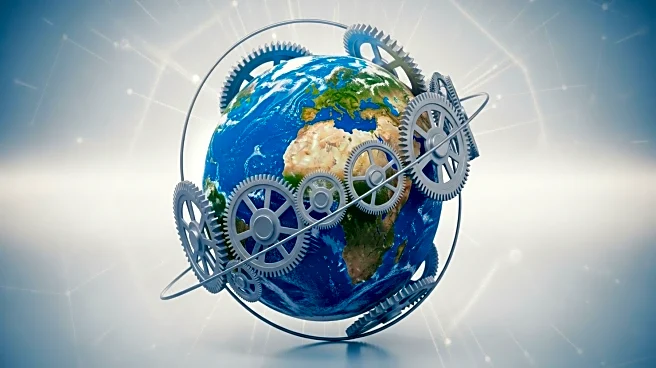What is the story about?
What's Happening?
During the 80th United Nations General Assembly (UNGA) sidelines, External Affairs Minister S. Jaishankar emphasized the importance of developing a global workforce. In a panel discussion organized by the Observer Research Foundation (ORF), Jaishankar highlighted India's billion-dollar initiatives in drinking water and technology-driven development as examples of fostering South-South cooperation. He argued that true multipolarity begins with building national capacity and that self-reliance, technology, and multipolarity are interconnected. Jaishankar suggested that the world must move towards a distributed global workforce model, transcending demographic limitations. Despite existing challenges, he expressed optimism that trade will continue to find new pathways, leading to diverse trade arrangements among nations.
Why It's Important?
Jaishankar's remarks underscore a significant shift in global economic and workforce dynamics. As countries like India invest heavily in technology and infrastructure, they are positioning themselves as key players in the global economy. The call for a global workforce reflects the need for countries to adapt to changing demographic trends and technological advancements. This approach could lead to increased international collaboration and trade, benefiting economies worldwide. However, it also presents challenges, such as ensuring equitable access to opportunities and managing geopolitical tensions. Countries that successfully navigate these changes stand to gain economically and politically, while those that fail may face stagnation.
What's Next?
The push for a global workforce model may lead to new international policies and agreements aimed at facilitating cross-border employment and collaboration. Countries might invest more in education and technology to prepare their populations for a globalized job market. Additionally, international organizations could play a role in standardizing practices and regulations to support this workforce model. Stakeholders, including governments, businesses, and civil society groups, will likely engage in discussions to address the challenges and opportunities presented by this shift.
Beyond the Headlines
The move towards a global workforce has deeper implications for cultural exchange and international relations. As people from diverse backgrounds work together, there is potential for increased understanding and cooperation across cultures. However, it also raises ethical questions about labor rights and the potential exploitation of workers in less developed regions. Long-term, this shift could redefine national identities and influence global power structures.

















